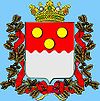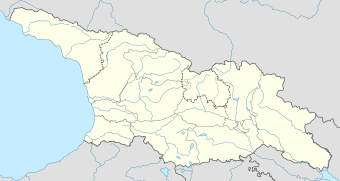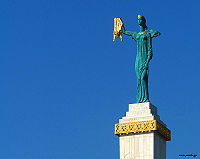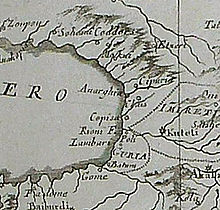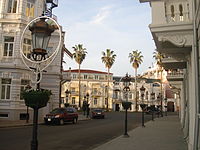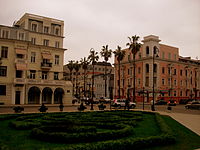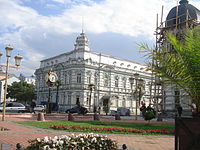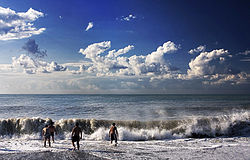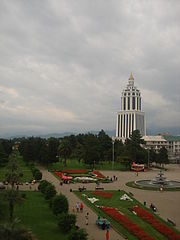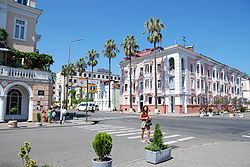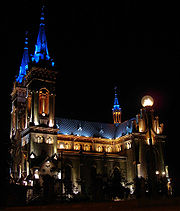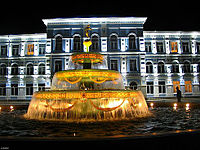- Batumi
-
Batumi
ბათუმი
Flag
Coat of armsLocation of Batumi in Georgia Coordinates: 41°39′0″N 41°39′0″E / 41.65°N 41.65°E Country Georgia Autonomous republic Adjara Government - Mayor Robert Chkhaidze Elevation 0 m (0 ft) Population (2008) - Total 123,500 Time zone Georgian Time (UTC+4) Website www.batumi.ge Batumi[1] is a seaside city on the Black Sea coast and capital of Adjara, an autonomous republic in southwest Georgia. Sometimes considered Georgia's second capital, with a population of 121,806 (2002 census), Batumi serves as an important port and a commercial center. It is situated in a subtropical zone, rich in agricultural produce such as citrus fruit and tea. While industries of the city include shipbuilding, food processing, and light manufacturing, most of its economy revolves around tourism.
Contents
History
Early history
Batumi is located on the site of the ancient Greek colony in Colchis called Bathus or Bathys – derived from the Greek phrase bathus limen or bathys limin meaning "deep harbour". Under Hadrian (r. 117–138 AD), it was converted into a fortified Roman port later deserted for the fortress of Petra founded in the times of Justinian I (r. 527–565). Garrisoned by the Roman-Byzantine forces, it was formally a possession of the kingdom of Lazica until being occupied briefly by the Arabs who did not hold it; in the 9th century it formed part of the Bagratid monarchy of Tao-Klarjeti and at the close of the 10th century of the unified kingdom of Georgia which succeeded it.
From 1010, it was governed by the eristavi (viceroy) of the king of Georgia. In the late 15th century, after the disintegration of the Georgian kingdom, Batumi passed to the princes (mtavari) of Guria, a western Georgian principality under the sovereignty of the kings of Imereti. A curious incident occurred in 1444 when the Burgundian flotilla, after a failed crusade against the Ottoman Empire, penetrated the Black Sea and engaged in piracy along its eastern coastline until the Burgundians under the knight Geoffroy de Thoisy were ambushed during their landing raid at the port of Vaty, as Europeans then knew Batumi. De Thoisy was taken captive and released through the mediation of the emperor John IV of Trebizond.
In the 15th century in the reign of the prince Kakhaber Gurieli, the Ottoman Turks conquered the town and its district but did not hold them. They returned in force a century later after the decisive defeat which they inflicted on the Georgian and Imeretian armies at Sokhoista. Batumi was recaptured, first by the prince Rostom Gurieli in 1564, who lost it soon afterwards, and again in 1609 by Mamia Gurieli. Since 1723 Batumi was part of the Ottoman Empire. With the Turkish conquest the Islamisation of the region, hitherto Christian began. It was completed by the end of the 18th century. Under the Turks; Batumi, a large fortified town (2,000 inhabitants in 1807 and more than 5,000 in 1877) was already an active port, the principal centre of the Transcaucasian slave-trade.[citation needed]
Imperial Russian rule
In 1878, Batumi was annexed by the Russian Empire in accordance with Treaty of San Stefano between Russia and the Ottoman Empire (ratified on March 23). In exchange, according to a secret Anglo-Ottoman Cyprus Convention, the British were to be allowed to occupy Cyprus – Cuprum probatum.[2] Occupied by the Russians on August 28, 1878, the town was declared a free port until 1886. It functioned as a center of a special military district until being incorporated in the Government of Kutaisi on June 12, 1883. Finally, on June 1, 1903, with the Okrug of Artvin, it was established as the region (oblast) of Batumi placed under the direct control of the General Government of Georgia.
The expansion of Batumi began in 1883 with the construction of the Batumi-Tiflis-Baku railway completed in 1900 by the finishing of the Baku-Batumi pipe-line. Henceforth Batumi became the chief Russian oil port in the Black Sea. The town expanded to an extraordinary extent and the population increased very rapidly: 8,671 inhabitants in 1882, and 12,000 in 1889. By 1902 there were 16000 in the port, 1000 worked in the refinery for Baron Rothschild's Caspian and Black Sea oil company.[3]
War, Communism and independence
During 1901, 16 years prior to the Russian Revolution, Joseph Stalin, the future leader of the Soviet Union, lived in the city organizing strikes. Unrest during World War I led to Turkey's re-entry in April 1918, followed by the British in December, who stayed until July 1920. Kemal Atatürk then ceded it to the Bolsheviks, on the condition that it be granted autonomy, for the sake of the Muslims among Batumi's mixed population.
When the USSR collapsed, Aslan Abashidze was appointed head of Adjara's governing council and subsequently held onto power throughout the unrest of the 1990s. Whilst other regions, such as Abkhazia, attempted to break away from the Georgian state, Adjara maintained an integral part of the Republic's territory. However, due to a fragile security situation, Abashidze was able to exploit the central government's weaknesses and rule the area as a personal fiefdom. In May 2004, he fled the region to Russia as a result of mass protests sparked by the Rose Revolution in Tbilisi.
Present day
Batumi today is the main port of Georgia. It has the capacity for 80,000-tonne tankers to take materials such as oil which is shipped through Georgia from Central Asia. Additionally the city exports regional agricultural products. Since 1995 the freight conversion of the port has constantly risen, with an approximate 8 million tonnes in 2001. The annual revenue from the port is estimated at between $200 million and $300 million.
Since the change of power in Ajara, Batumi has attracted several international investors with real estate prices in the city trebling since 2001. Kazakh investors have reportedly invested $100 million to purchase more than 20 hotels in the Ajara region of Georgia. Construction of a number of new hotels will be launched in Ajara’s Black Sea resorts starting from 2007.[dated info]
Batumi was also host to the Russian 12th Military Base. Following the Rose Revolution, the central government pushed for the removal of these forces, and in 2005 an agreement with Moscow was reached. According to the agreement, the process of withdrawal was planned to be completed in a course of 2008, but the Batumi base was officially handed over to Georgia on November 13, 2007, ahead of planned schedule.[4]
In July 2007, the seat of the Constitutional Court of Georgia was moved from Tbilisi to Batumi in an attempt to further facilitate the regional development.[5]
Climate
Batumi lies at the northern periphery of the humid subtropical zone. The city's climate is heavily influenced by the onshore flow from the Black Sea and is subject to the orographic effect of the nearby hills and mountains, resulting in significant rainfall throughout most of the year, making Batumi the wettest city in both Georgia and the entire Caucasus Region.
The average annual temperature in Batumi is approximately 14 °C (57 °F). January is the coldest month with an average temperature of 7 °C (45 °F). August is the hottest month, with an average temperature of 22 °C (72 °F). The absolute minimum recorded temperature is −9 °C (16 °F), and the absolute maximum is 40 °C (104 °F). The number of days with daily temperatures above 10 °C (50 °F) is 239. The city receives 1958 hours of sunshine per year.
Batumi's average annual precipitation is 2,718 mm (107.0 in). September is the wettest month with an average of 335 mm (13.2 in) of precipitation, while May is the driest, averaging 92 mm (3.6 in). Batumi generally does not receive significant amounts of snow (accumulating snowfall of more than 30 cm.), and the number of days with snow cover for the year is 12. The average level of relative humidity ranges from 70–80%.
Climate data for Batumi Month Jan Feb Mar Apr May Jun Jul Aug Sep Oct Nov Dec Year Record high °C (°F) 23
(73)26
(79)28
(82)32
(90)33
(91)36
(97)40
(104)32
(90)34
(93)31
(88)30
(86)28
(82)40
(104)Average high °C (°F) 10
(50)11
(52)12
(54)16
(61)19
(66)23
(73)26
(79)26
(79)23
(73)19
(66)16
(61)12
(54)18 Daily mean °C (°F) 7
(45)7
(45)9
(48)12
(54)16
(61)20
(68)22
(72)22
(72)20
(68)16
(61)12
(54)9
(48)14.3 Average low °C (°F) 4
(39)4
(39)5
(41)9
(48)13
(55)17
(63)19
(66)19
(66)16
(61)13
(55)9
(48)6
(43)12 Record low °C (°F) −5
(23)−7
(19)−5
(23)1
(34)5
(41)6
(43)11
(52)7
(45)10
(50)1
(34)1
(34)−6
(21)−7
(19)Precipitation mm (inches) 281
(11.06)228
(8.98)174
(6.85)122
(4.8)92
(3.62)163
(6.42)182
(7.17)255
(10.04)335
(13.19)306
(12.05)304
(11.97)276
(10.87)2,718
(107.01)Source: weatherbase.com[6]  Enrique Iglesias performs on stage during MTV Live Georgia at Europe Square on August 2, 2011 in Batumi, Georgia.
Enrique Iglesias performs on stage during MTV Live Georgia at Europe Square on August 2, 2011 in Batumi, Georgia.
Transportation
The city is served by Batumi Airport, one of three international airports in the country.
Subdivisions
According to the March 31, 2008 decision of the Batumi City Council, Batumi is divided into seven boroughs, those of:
- Old Batumi (ძველი ბათუმის უბანი)
- Khimshiashvili (ხიმშიაშვილის უბანი)
- Bagrationi (ბაგრატიონის უბანი)
- Aghmashenebeli (აღმაშენებლის უბანი)
- Javakhishvili (ჯავახიშვილის უბანი)
- Tamar (თამარის უბანი)
- Boni-Gorodok (ბონი-გოროდოკის უბანი)[7]
Demographics and religion
According to the 2002 Georgian census, Batumi had a population of 121,806 with population density of 7293.8 per km2. Ethnic groups include:
- Georgians – 104,313
- Armenians – 7,517
- Russians – 6,300
- Abkhaz – 800
- Ukrainians – 770
- Greeks – 587
- Azerbaijani – 301
- Ossetians – 142
- Yazidi – 69
- Kists – 8.[8]
Batumi is a home to Eastern Orthodox Christian, Muslim, Catholic, Armenian Apostolic, and Jewish communities. The places of worship in the city are:
- The Georgian Orthodox Cathedral of the Mother of God, and Saint Barbara Church
- The Catholic Church of the Holy Spirit
- The Batumi Mosque
- The Batumi Armenian church
- The Batumi Synagogue[9]
Main sights
Attractions include
- the Adjara State Museum
- Batumi Botanical Garden, started (like the previous) by professor Krasnov (brother of the general Pyotr Krasnov)
- aquarium
- circus
- Medea statue
- former resort area along the Black Sea coast.
Postage stamps
Twin towns and sister cities
 Italy, the city Bari, 1987.[10]
Italy, the city Bari, 1987.[10] Spain, the city San Sebastian, 1987.[10]
Spain, the city San Sebastian, 1987.[10] USA, the city Savannah, 1992.[10]
USA, the city Savannah, 1992.[10] Greece, the city Piraeus, 1996.[10]
Greece, the city Piraeus, 1996.[10] Turkey, the city Trabzon, 2000.[10]
Turkey, the city Trabzon, 2000.[10] Armenia, the city Vanadzor, 2006.[10]
Armenia, the city Vanadzor, 2006.[10] Greece, the city Volos, 2007.[10]
Greece, the city Volos, 2007.[10] Ukraine, the city Yalta, 2008.[10]
Ukraine, the city Yalta, 2008.[10] Bulgaria, the city Blagoevgrad, 2008.[10]
Bulgaria, the city Blagoevgrad, 2008.[10] Ukraine, the city Ternopil, 2011.[10]
Ukraine, the city Ternopil, 2011.[10] Colombia, the city Cartagena.
Colombia, the city Cartagena.
Notable people
Notable people who are from or have resided in Batumi:
- Katie Melua, singer
- Mary, Princess Eristavi, Georgian princess and model
- Valery Meladze, singer
- Sopho Khalvashi, first Georgian entrant to the Eurovision Song Contest 2007
- Arkady and Boris Strugatsky, science fiction authors
- Herbert Backe, Reich Minister of Food, Agriculture and Forests
- William Horwood Stuart, British diplomat who was murdered there in 1906
- Fyodor Yurchikhin, astronaut
- Odysseas Dimitriadis (1908–2005) Greek-Soviet music conductor
References
- ^ Georgian: ბათუმი.
- ^ Zaim M. Necatigil (1993), The Cyprus Question and the Turkish Position in International Law, p. 3. Oxford University Press, ISBN 0198258461.
- ^ Simon Sebag Montefiore, Young Stalin, page 77.
- ^ "Russia Hands Over Batumi Military Base to Georgia". Civil Georgia, Tbilisi. November 13, 2007. http://www.civil.ge/eng/article.php?id=16321.
- ^ http://www.constcourt.ge/index.php?lang_id=ENG&sec_id=13
- ^ "Weatherbase". http://www.weatherbase.com/weather/weather.php3?s=48473&refer=&units=us. Retrieved April 6, 2009.
- ^ (Georgian) დადგენილება N 3-1 ბათუმის უბნები (Decision #3.1. Boroughs of Batumi). Batumi City Council. Accessed November 15, 2009
- ^ "Georgia Census 2002: Ethnic group by major administrative-territorial units". State Departments of Statistics of Georgia. Archived from the original on October 6, 2007. http://web.archive.org/web/20071006235033/http://www.statistics.ge/_files/english/census/2002/Ethnic+groups.pdf. Retrieved October 11, 2007.
- ^ "Batumi: sights". Official website of Batumi. http://batumi.ge/en/?page=show&sec=75. Retrieved May 10, 2009.
- ^ a b c d e f g h i j ზოგადი ინფორმაცია / დამეგობრებული ქალაქები.Template:Ref-ka
- Georgian Soviet Encyclopedia. Georgian SSR (Supplementary Edition). 1981. pp. 16–18.
External links
- Official website of Batumi
- Batumi city tour, Department of Tourism and Resorts of Adjara
- Map of Batumi, Department of Tourism and Resorts of Adjara
- Batumi city navigator
- Batumi Sea Port
- Prokudin-Gorskii color photos of Batumi circa 1910
- Photo gallery "Batumi Today". Government of Adjara website
- Historical postcards of Batumi
- Photos of new Batumi
Coordinates: 41°38′19″N 41°38′14″E / 41.63861°N 41.63722°E
Cities and towns in Georgia Autonomous Republic of Abkhazia Sokhumi · Akhali Atoni · Gagra · Gali · Gudauta · Ochamchire · Tkvarcheli · Bichvinta · Gantiadi · Gulripshi · Leselidze · Miusera.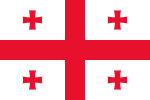
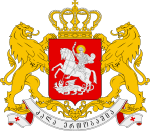
Autonomous Republic of Adjara Guria Imereti Kakheti Mtskheta-Mtianeti Samegrelo-Zemo Svaneti Samtskhe-Javakheti Akhaltsikhe · Akhalkalaki · Borjomi · Ninotsminda · Vale · Abastumani · Adigeni · Akhaldaba · Aspindza · Bakuriani · Bakurianis Andeziti · Tsagveriacha-Lechkhumi and Kvemo Svaneti Kvemo Kartli Shida Kartli Cities with local Government Capital City Autonomous Republic of Abkhazia Autonomous Republic of Adjara Batumi · Keda · Kobuleti · Shuakhevi · Khelvachauri · KhuloGuria Imereti Kakheti Mtskheta-Mtianeti Racha-Lechkhumi and Kvemo Svaneti Samegrelo-Zemo Svaneti Poti · Abasha · Zugdidi · Martvili · Mestia · Senaki · Chkhorotsku · Tsalenjikha · Khobi · Zemo AbkhaziaSamtskhe-Javakheti Kvemo Kartli Shida Kartli
Wikimedia Foundation. 2010.

